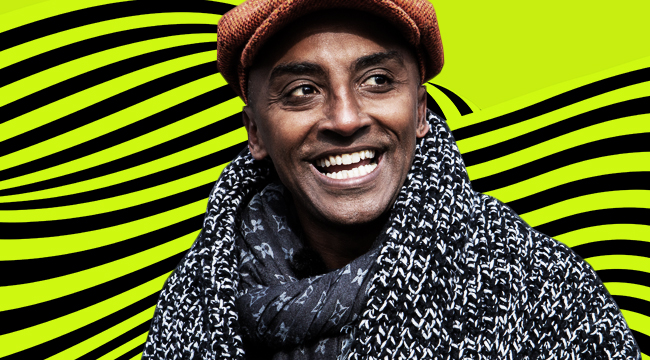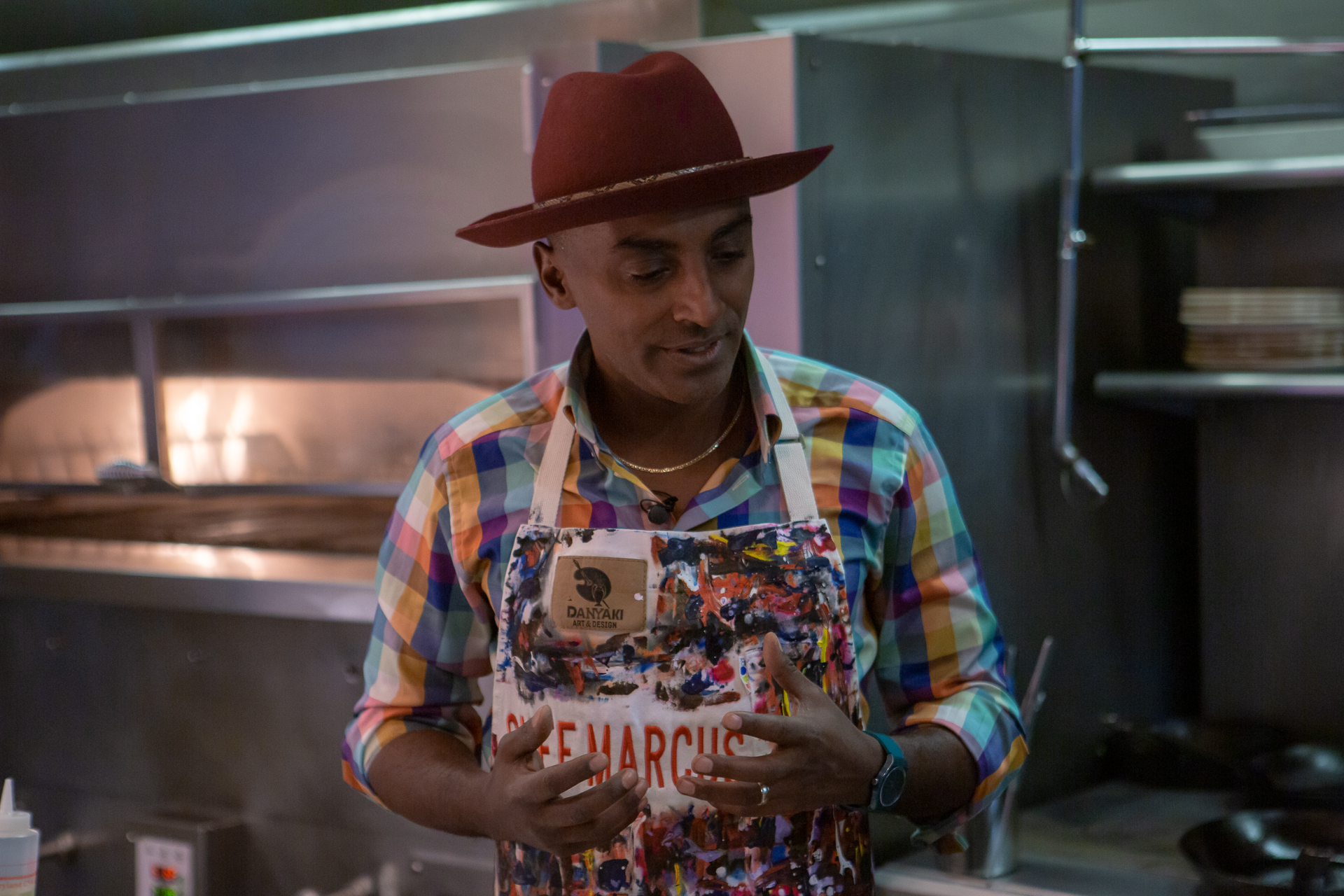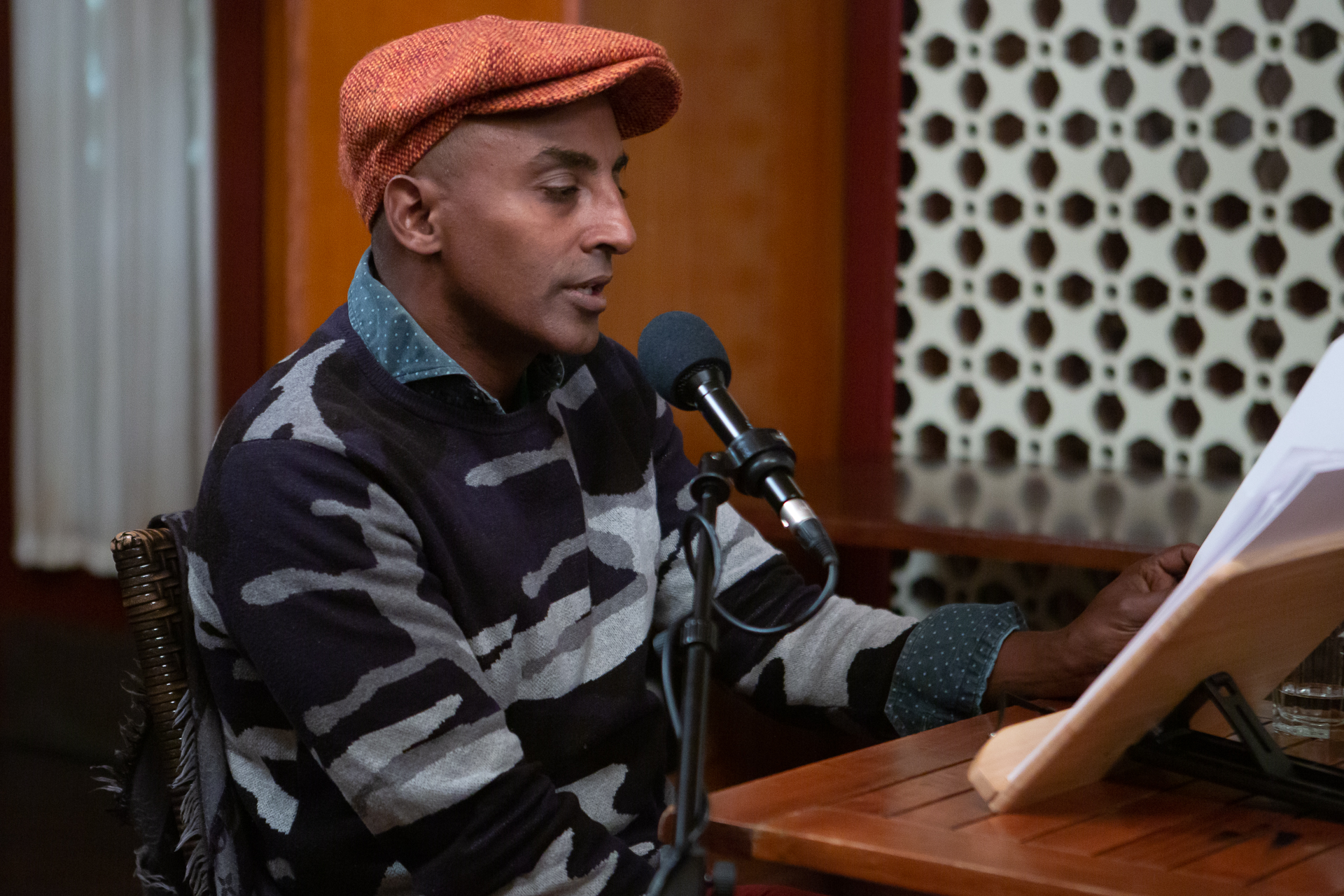
Marcus Samuelsson is a lion of the modern food scene. This doesn’t simply come from his incredible string of successes in the kitchen (Aquavit, Red Rooster, Streetbird Rotisserie), his high-visibility TV projects (he’s a judge on Chopped and hosts No Passport Required on PBS), or even his Beard-Award winning writing (he’s authored New American Table, The Soul of a New Cuisine, Marcus Off Duty, The Red Rooster Cookbook, Yes, Chef, and Make it Messy: My Perfectly Imperfect Life) — though the degree of his success is undeniable. His incredible importance to food culture in America is also thanks to his spirit of inclusion. His desire to highlight new voices and spread love in a historically cloistered industry.
Nowhere is this so evident as with the release of Our Harlem – Seven Days Of Cooking, Music, And Soul At The Red Rooster. Samuelsson calls the book a “kitchen listen” — a riff on The Red Rooster Cookbook that forgoes dry recipe readings in favor of an eclectic, dynamic performance. You hear Samuelsson, his culinary friends, his team, and important voices in the Harlem community. You also hear a lot of laughter. The project is literally loaded with people having fun talking about where food and one of the nation’s most historic neighborhoods intersect.
Last week, I spoke with Samuelsson about the project, the modern food scene, and the controversial topic of food appropriation.

Let’s talk about Our Harlem, because I really liked it a lot. Can you tell me about it and how it came together?
When I did The Red Rooster Cookbook, I wanted the stories and recipes in it to come alive, right? It’s so powerful when you hear multiple voices of our community, our restaurant, and our culture come together. And The Red Rooster Cookbook really did that, but it was a cookbook.
So when Audible asked me to partner with them on what would become Our Harlem, I could quickly see that multi-faceted nature of the neighborhood, the different voices, and the deep texture of our community were all better articulated through voices and music than simply reading what was on the page.
For me, it was also important that I wasn’t the only person. This isn’t just about me, you know what I mean?
Sure. And I think you’ve become — over the past, I would say… decade — this massive voice advocating for food in both the black American heritage tradition but also the immigrant community. You’re fighting to tell the story of how these different voices in American food really create part of our shared American foodway. One that’s much more nuanced than I think people have understood historically in food media.
Yeah, but neither of those are coincidences, right? [Laughs] History is always told by through the lens of the winner, right? And I have the luxury of being a black man and I’ve also had the luxury of being an immigrant, right?
When you look at that intersection, there would be no modern American food without the contribution of African Americans and immigrants. And the fascinating thing is that through food media, we invest enormous amounts of money and know-how and tourism — going to Italy to talk about Tuscany or going to France… but we didn’t historically invest an enormous amount of money into this story about the American immigrant or the African American community in terms of food, right?
So this audio project is an opportunity to have authorship of how the African American experience is represented in the food world. This is an opportunity to tell stories and create a level of curiosity in urbanism and how a restaurant fits into that place, but also how much richer the community is because of it. Red Rooster isn’t just at an address that happens to be in Harlem. There is no Red Rooster without Harlem.
And for me, I wanted to show — I’m lucky and fortunate enough to be able to build this, but it wouldn’t happen without the massive sacrifices of others. I’m standing on the shoulders of the Civil Rights movements and people who gave their lives for the culture. This book — a digital cookbook… a kitchen listen… whatever you want to call it — gives an opportunity to share those voices and tell those stories.
Do you feel like mainstream food media is doing a better job now of recognizing how many different foodways and how many different influences our food has? Or do you still feel like it’s an uphill battle, or banging on the door to get people to listen to these stories?
Because of the internet and because of social media, anyone can tell a story today. That actually benefits minority communities, right? Before, it was these traditional platforms and they all did the Italy issue, or they did the France Wine Bordeaux issue, and there was very little opportunity to tell complex stories here in America. Black food was only told by through the lens of one aspect, right? And of course, there are several aspects. Why would it be one aspect? We’re not monolithic in our food experience, right?
By opening Red Rooster, by really working on creating Harlem EatUp!, and having dinners like Mashama Bailey meets Massimo Bottura, or Daniel Boulud meets Charles Gabriel from Charles’ Country Pan Fried Chicken. Those are work and we invested in them to help chefs from all segments of the food world meet each other.
I think through that work you’re getting down to this very important thing, which is that — while I do understand and, and we’ve covered quite a bit, the idea of food appropriation — there is something inherent in cooking that is a cultural exchange.
We talk constantly about the differences between merging foods and remixing foods versus appropriating foods or colonizing foods. Where do stand on all of that as you go through this odyssey?
Well first of all, thanks for creating that platform, and cooking your own amazing mashups. Because out of that we’re going to see those similarities of food styles, but also where they’re different, right? I’m super excited to hear food stories. And as a person of color, I am African but I’m also American, which is different than African American. I grew up with berbere and Ethiopian spices. But you can obviously be African American and grow up with collards and more West African influences, right?
As black people, we know this. But to the food world, it often has to be one thing. Black American food has to be one thing and not many until we’re willing to bring people in to start unpacking it and sharing it. This conversation is all about what I call the new noir. Which, to me, really means a new way to document and tell stories under the black lens. And once you’re under that, you realize that [2x Beard Award-Winning Chef] Edouardo Jordan lives in Seattle but grew up in Florida, and will cook very differently than me, though there are certain things we share.
As a young black man, I didn’t know anything about fried chicken. And I talked about that in the book, about I didn’t grow up with this dish. I grew up with herring. There was so much fear was for me to go into the Harlem community without that taste memory when I want to make it my staple dish on it, right? I think sharing that fear works in a digital experience in Our Harlem. It’s so much better through voices, than it even is maybe in writing in a book, right? And it allows me to make it less about me. I don’t want to be the chef that said I had it all figured out, because I haven’t.
I think that’s so important that you say that part of cooking is having to embrace your fear that you’re not going to get it right. I think that that’s such a beautiful thing. In the cases where we’ve seen, where especially white chefs have been accused of appropriation, and for me, as an editor, to have said, “Well, I think they have misstepped here” — it always comes from the fact that their fear isn’t on the page. That they think they have an authoritative version of something when both you and I know how hard it is to have an authoritative version of anything in food.
That’s what’s so beautiful about this moment, right? There are checks and balances. Whether it’s on the food writing side, or the consumer side, or the chef’s side, or the hospitality side. It hasn’t always been like that. Before certain people and communities had voices and other people were anonymous.
One of the reasons why I built a big, open kitchen at Red Rooster was because I wanted people to see, “Oh, 70% of the people are of color.” We want to turn the anonymous journey into the visible journey and one way to do it is this way.
I’ve followed your career closely, especially over the past couple of years, and one of the things that you do such a good job with, in my impression, is being a little bit like a record producer: in that you’re highlighting other people and their talents along with staying in the game like Jay-Z does, right? You’re still going to drop the album. You’re still going to get in the kitchen when it’s time. But I think you do a great job of highlighting people and giving people a showcase.
It’s exactly how I see my duty. I was fortunate enough to enter a room, but most of the time I was the only one. And it really made me think, “Why is it that it’s this way? What can I do? What can I contribute to make sure that this room looks a little different in the future?”
Now you have so many amazing talents — Kwame Onwuachi, Adrienne Cheatham, Mashama Bailey — all of them are kind of the next generation. They’re amazing. I know that… And you know what who’s going to be better for it? The dining scene in America. You can’t be on two sides on this, you know what I mean? We will benefit as food lovers, that’s it.
So, I think it’s a great time to cook… but it’s also important to recognize the people that came before us. And that’s a little bit of what Our Harlem sets out to do.

Kwame has been a longtime friend of our site, and one of the things that he knew he wanted to fight against, was this idea that any food that was inspired by the southern American tradition or the historically black tradition, somehow always has to be classed as “comfort food.” Which carries us into this other conversation, about those foodways not being taken seriously from the critical standpoint for a long time.
Kwame has a very clear vision in his food. And I was fortunate enough to work in kitchens where I learned that refinement as well. So it takes… we’re blessed for that, right? Everyone doesn’t have that and everyone shouldn’t do that, because they should do dishes that inspire them and cook their food. And I think — Edouardo is an example, Mashama is an example — of knowing how they want to cook and then executing it. As long as people cook their food, that’s the most important thing.
As long as there’s an audience out there, we don’t have to put a limit on what food can and should be. If Kendrick Lamar drops a jazz album, he should have every right to do that because he has that jazz influence, you know what I mean? We’ve learned through musicians to merge ideas — from gospel to trap basically, right? And in food, we’re just at the beginning of this process.
One of the things that we’ve been trying to get way out ahead of covering — thanks to the fact that our lead food writer is Indigenous — is the Indigenous food scene and the comeback it’s making. I’m sure you’re aware of Sean Sherman and the work he’s doing, but are you seeing that movement gain wider traction in some of your circles? Are people talking about how corn and hominy and chilies all have an Indigenous tradition also?
I am so excited that you brought this up because, for next season on my show No Passport Required, I’ve said, I’ve required, that we have to have Indigenous American cooking episode. We talk about “no passport required,” but if we mean that, we have to go back to Indigenous cooking. I don’t know enough yet, but I’m scratching it and I’m doing my research right now. I want to be very slow and get it right. Hopefully, get it right.
It’s not about having a cool conversation. It’s about understanding and being informative, and hopefully, other people can come to this space and cover the movement, too.
Our Harlem – Seven Days Of Cooking, Music, And Soul At The Red Rooster is available on Audible today.






